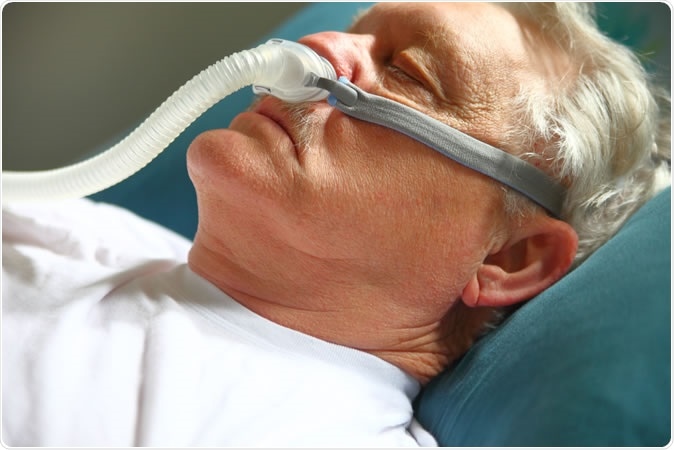A new Taiwanese study presented on October 14, 2019, at the Annual Meeting of the American Academy of Ophthalmology, reports that macular edema in diabetes occurs more often in those who have severe sleep apnea. Diabetic macular edema is a complication that affects the retinal area concerned with sharp central vision. As a result, damage to this area can cause vision loss.
Earlier studies indicated the existence of such a link, but newer evidence shows that sleep apnea is a major risk factor in causing aggravation of already existing eye disease. The damage to the retina is a result of microvascular injury, or injury to the tiny blood vessels supplying the retina. High levels of blood sugar cause the blood vessel walls to bulge out, affecting the smooth inner lining cells of the retinal capillaries, the endothelial cells. As these cells are pushed outward, the connections between adjacent cells give way and variable amounts of fluid and blood leak out into the retinal tissue surrounding the capillary. This causes severe inflammatory changes, which in turn leads to diabetic retinopathy.

Male with breathing apparatus for sleep apnea. Image Credit: Alice Day / Shutterstock
Sleep apnea
Sleep apnea is a sleep-related breathing disorder in which the sleeper shows repeated bouts of temporary stoppage of breathing for a few seconds, followed by starting up again. The stoppage is thought to be due to a reversible but repeated blockage of the upper part of the airway by reduced muscle tone during deep sleep. For this reason it is also called obstructive sleep apnea.
This pattern causes poor-quality sleep, because the person cannot continue in deep sleep for the normal duration, being woken up transiently by the need to breathe. The patient typically makes loud snoring or gasping noises during sleep periods, without waking up. Daytime sleepiness is also characteristic. The irregular respiration causes hypoxia, or oxygen deprivation to the body. As a result, the blood vessels undergo damage through multiple mechanisms.
To diagnose sleep apnea, doctors look at the number of times the breathing slows down significantly or stops in an hour (“apnea events”), and also test the blood oxygen levels at these times. If not diagnosed and treated, sleep apnea can cause cardiovascular events like heart attacks, cancer, dementia, and glaucoma in addition to diabetes.
The presence of sleep apnea in a diabetic may promote the development of diabetic retinal damage. If the patient already has diabetic retinopathy, sleep apnea can aggravate it by making the body more resistant to the action of the glucose-lowering hormone insulin. Sleep apnea, in addition, increases the level of inflammation, and the associated increase in blood pressure in these patients is the final nail in the coffin for the diabetic retina.
The study
The current study looked at records on all patients with diabetic retinopathy who were seen at one Taiwanese hospital over a period of 8 years. They found that the incidence of severe sleep apnea was much higher, at 81%, in diabetics who had macular edema, than in those without this condition (at 45%). Macular edema grading worsened with the severity of sleep apnea. The same correlation was verified by observing that patients who needed more treatment (three or more sessions of retinal laser therapy) for their macular edema had a higher incidence of severe sleep apnea.
Implications
Researcher Julian Chiang says the study aims to arouse doctors to a sense of the importance of sleep apnea in predisposing to macular edema in diabetics. He comments: “This could allow for earlier medical intervention so patients can keep more of their vision and preserve their overall health as much as possible.”
Sleep apnea is treated using various devices to keep the upper airway open during sleep, such as a continuous positive air pressure (CPAP) machine. Various specialist mouthpieces are also used by some patients to prevent the jaw from collapsing the upper airway during sleep. Tongue retainers, muscular therapy for both mouth and face muscles, and even surgical removal of part of the soft palate are other treatments that are offered in specialist sleep clinics. Weight loss programs, dietary modifications and other lifestyle changes to reduce body weight and stress levels are also an essential and independent part of sleep apnea treatment.